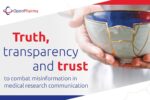This week, we encourage you to contribute to two surveys about equitable open access and AI tools in research communication. We learn about Elsa – the new AI tool developed by the US FDA – and read our latest blog post about the ALPSP University Press Redux Conference. We also share news of this year’s Peer Review Week theme, and read about the promise and pitfalls of scientific knowledge maps. Finally, we explore how shared metadata stewardship can improve the efficiency of research communication and learn common AI terms you’re likely to encounter in discussions with your colleagues.
To engage with:
OASPA wants to know how you would achieve equitable OA via OASPA
The Open Access Scholarly Publishing Association (OASPA) is seeking perspectives from the scholarly communications community on achieving “truly equitable global open access” (OA). As part of the Next 50% project, stakeholders are encouraged to share their comments on the OASPA Project primer – setting the stage for a ‘different conversation’ about open access by completing this survey by 11 July 2025. Your responses will be used by OASPA to “enable constructive and meaningful progress across stakeholder groups, and inform transition journeys to publishing and supporting open access.”
Have your say: AI tools in research communication via enago
Calling all scholarly communications professionals, publishers and researchers! Enago wants to understand your awareness of guidelines for AI use and how you’re using AI tools in the dissemination of research outcomes. Complete this 10–15 minute survey titled Responsible use of AI in academic publishing: a global study on the use, risks, and policy gaps to help shape ethical standards, strengthen trust and promote fairness in academic writing.
To watch:
FDA launches agency-wide AI tool via US Food & Drug Administration | 2-minute watch
On 2 June 2025, the US Food and Drug Administration (FDA) announced the launch of an agency-wide artificial intelligence (AI) tool designed to help its employees work more efficiently. The tool – called Elsa – is already being used by the agency to “accelerate clinical protocol reviews, shorten the time needed for scientific evaluations, and identify high-priority inspection targets”, explains Marty Makary (US Commissioner of Food and Drugs at the FDA) in this news release.
To read:
Highlights from the ALPSP University Press Redux Conference via Open Pharma | 7-minute read
On the 3 and 4 April 2025, Open Pharma participated in the Association of Learned and Professional Society Publishers (ALPSP) University Press Redux Conference as a bronze sponsor. The 2-day conference, hosted in partnership with Oxford University Press, focused on the theme of transitions in academic publishing and examined the opportunities and challenges offered by AI, the journey towards 100% open access and the changing publishing landscape. In this article, Joanna Donnelly (Communications Consultant at Oxford PharmaGenesis) reflects on her experience at the conference and considers implications for Open Pharma’s mission to drive transparency in the communication of pharma-sponsored research.
Peer Review Week 2025 theme announced via The Scholarly Kitchen | 5-minute read
The theme for Peer Review Week 2025 has been announced as Rethinking peer review in the AI era. Taking place from 15 to 19 September 2025, Peer Review Week is an opportunity for the scholarly communications community to come together to explore themes that influence the processes underpinning trust in research publications. As the co-chairs of the Peer Review Week 2025 committee explain, this year’s theme “is not just about reacting to change; it’s about proactively shaping the future of peer review, together”. Learn more about how to get involved and submit your event on the Peer Review Week website.
The promise and pitfalls of scientific knowledge maps via LSE Blogs | 6-minute read
Knowledge maps are essential tools for navigating the ever-expanding landscape of research, helping policymakers, researchers and students understand how ideas, contributors and institutions are connected. In this article, Yi Bu (Assistant Professor, Department of Information Management at Peking University) explores the promise and pitfalls of these visual guides, arguing that flawed maps can mislead decision-makers, obscure emerging fields and reinforce biases. Bu calls for greater transparency in how knowledge maps are constructed and urges the development of more inclusive, accurate and dynamic mapping practices that better reflect the diversity and complexity of global research.
COMET-ing to collective metadata via LSE Blogs | 6-minute read
“Infrastructure is not just code or standards. It reflects how we organise trust, authority and participation”, begins this post by John Chodacki (Director of the University of California Curation Center), Adam Buttrick (Product Manager for Persistent Identifiers at California Digital Library), Juan Pablo Alperin (Associate Director of Research for the Public Knowledge Project), Clare Dean (Independent Marketing and Outreach Consultant) and Dione Mentis (Project Lead: Community Metadata Enrichment at DataCite). In this article, the authors explore initiatives such as the Collaborative Metadata Enrichment Taskforce (COMET) to demonstrate the importance of shared metadata stewardship.
AI terms for healthcare and scientific communication via The MAP Newsletter | 9-minute read
Are you excited about the potential of AI but confused by the ever-expanding domain terminology? This article – and the associated lexicon – from the International Society for Medical Publication Professionals (ISMPP) AI taskforce “explains the most important terms, offering an accessible overview of key AI terms you’re likely to encounter in discussions, research, and applications related to medical publications” and answers questions about how AI is shaping the medical communications ecosystem.
Enjoy our content? Read last week’s digest and check out our latest opinion piece!
Don’t forget to follow us on Bluesky and LinkedIn for regular updates!


![[[A close-up view of a traditional printing press in operation, showing metal type and inked rollers in motion as printed material is prepared.]]](https://www.openpharma.blog/wp-content/uploads/2025/12/16Dec25-150x100.jpg)



